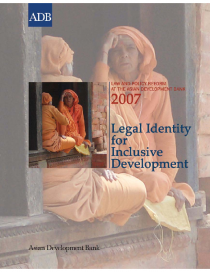This publication presents the findings of an Asian Dvelopment Bank multi-country study on legal identity. Based on extensive field research conducted in Bangladesh, Cambodia, and Nepal, the study assesses the potential and actual value of legal identity, given the realities of the developing country context.
Broadly speaking, "legal identity" refers to a human being's legal (as opposed to physical) personality. Legal identity allows persons to enjoy the legal system's protection and to enforce their rights or demand redress for violations by accessing state institutions such as courts and law enforcement agencies.
The study shows that in a number of instances, other identity documents, such as citizenship certificates or family and lodging books, proved to be more important than birth certificates in so far as access to benefits and opportunities are concerned. In light of these realities, rather than narrowly focusing on birth certificates, the research commenced with a review of the range of identity documents that are used in the three countries and looking at what functions these documents actually serve in people's lives.


